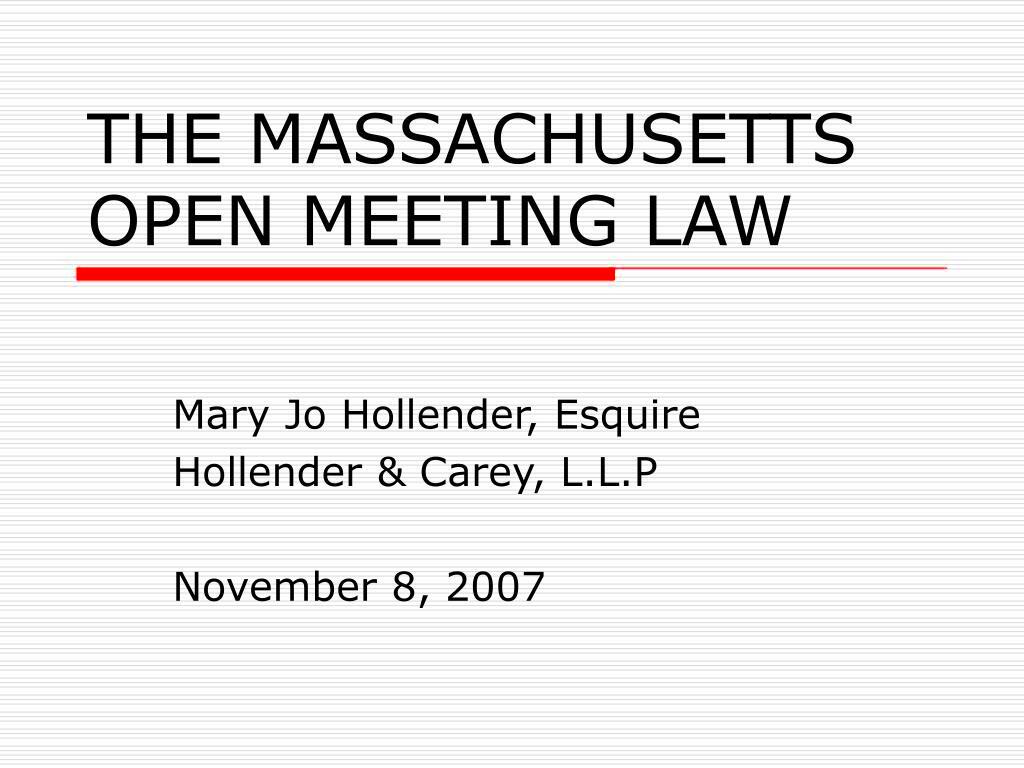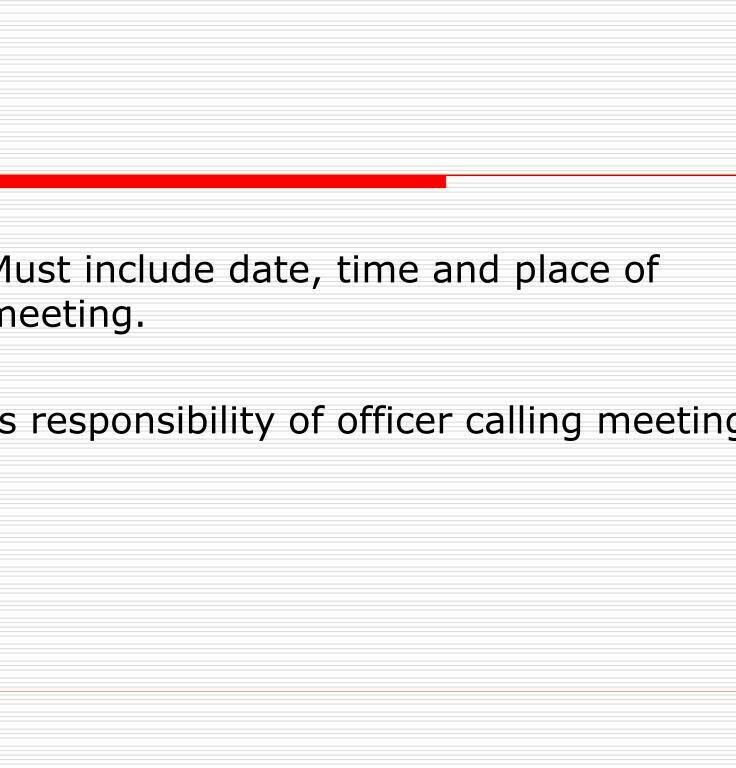A Comprehensive Guide to Massachusetts Open Meeting Law
The Massachusetts Open Meeting Law is designed to promote transparency and accountability in government. This law ensures that meetings held by public bodies are accessible to the public, allowing citizens to observe and participate in governmental decisions. By fostering openness, the law aims to enhance public trust in government operations. Understanding this law is crucial for both public officials and community members alike.
Purpose and Importance of Open Meeting Law

The primary purpose of the Massachusetts Open Meeting Law is to guarantee that the public has the right to attend and participate in meetings held by government bodies. Here are a few key points about its significance:
- Transparency: Ensures that governmental processes are open and clear.
- Public Engagement: Encourages community involvement in local decision-making.
- Accountability: Holds public officials responsible for their actions and decisions.
- Trust Building: Helps build trust between citizens and their government by promoting open communication.
By establishing clear rules for public meetings, the law aims to foster a democratic environment where everyone has a voice. This is especially important in a state like Massachusetts, where local government plays a significant role in community life.
Who is Covered by the Law

The Massachusetts Open Meeting Law applies to a wide range of public bodies. Understanding who is included is essential for compliance. Here’s a breakdown of who is covered:
- State Agencies: Includes all state departments, agencies, and boards.
- Local Government: Covers city councils, town boards, and other local entities.
- Quasi-Public Agencies: Includes authorities and commissions created by the state.
- Committees: Any committee established by a public body is also included.
However, it’s important to note that private organizations and non-profits are generally not covered unless they are performing public functions or receiving public funds. Understanding the scope of the law helps ensure that public bodies are compliant and that citizens are aware of their rights to access these meetings.
What Constitutes a Meeting
In Massachusetts, the Open Meeting Law defines a meeting as any gathering of a public body to discuss or decide on public business. This can include a variety of formats, such as in-person meetings, video conferences, and even telephone calls. Understanding what qualifies as a meeting is crucial for compliance. Here’s what you need to know:
- Deliberation: Any discussion among a quorum of members about public business constitutes a meeting.
- Decision-Making: If a public body is making decisions, it’s likely a meeting.
- Public Business: Discussions must pertain to the public’s interest and not personal matters.
Meetings also include informal gatherings where members discuss official business, even if the meeting is not formally called. It’s essential for public officials to be aware that any such interactions can fall under the law, ensuring the public can attend or be informed about the discussions that affect them.
Notice Requirements for Meetings
Notice requirements are a key part of the Massachusetts Open Meeting Law. They ensure that the public is adequately informed about when and where meetings will occur. Here’s a closer look at what these requirements entail:
- Advance Notice: Public bodies must provide notice at least 48 hours before a meeting. This gives the public a chance to attend.
- Posting Locations: Notices should be posted in a prominent location, typically on the official website and at the meeting place.
- Content of Notice: The notice must include the date, time, and location of the meeting, along with a list of topics to be discussed.
- Emergency Meetings: In emergencies, meetings may be called with less notice, but a good reason must be provided.
These requirements aim to keep the public informed and engaged, allowing citizens to participate in the democratic process actively. Following these guidelines is essential for compliance and fostering trust with the community.
Access and Transparency Provisions
The Massachusetts Open Meeting Law places a strong emphasis on access and transparency, ensuring that the public can participate in and observe government meetings. Here are the key provisions:
- Open to the Public: All meetings must be open to the public, except in certain circumstances outlined by the law.
- Minutes Requirement: Public bodies are required to keep minutes of meetings, which must be made available to the public.
- Recordings: Meetings can be recorded, and public bodies must allow this unless it disrupts the meeting.
- Access for Individuals with Disabilities: Facilities must be accessible, ensuring everyone can attend and participate.
By enforcing these access and transparency provisions, the Open Meeting Law helps to ensure that the decision-making processes are visible to the public. This fosters trust in government and encourages citizen engagement, which is vital for a healthy democracy.
Enforcement and Penalties
The Massachusetts Open Meeting Law has specific enforcement mechanisms and penalties to ensure compliance. Understanding these aspects is essential for public officials and citizens alike. Here’s how enforcement works:
- Enforcement Authority: The Attorney General’s Office oversees the enforcement of the Open Meeting Law. They handle complaints and ensure public bodies comply.
- Complaint Process: If a citizen believes a public body has violated the law, they can file a complaint with the Attorney General within 30 days of the alleged violation.
- Investigation: The Attorney General will investigate the complaint and may hold a hearing if necessary.
- Penalties: If a violation is found, the public body may face a variety of penalties, including:
- Educational Training: Members may be required to attend training on the Open Meeting Law.
- Fines: Individual members can face fines ranging from $1,000 to $5,000 for willful violations.
- Nullification of Actions: Actions taken in violation of the law may be declared void.
These enforcement measures are designed to ensure that public bodies take their responsibilities seriously, protecting the public’s right to transparency and participation in government processes.
Common Exceptions to the Law
While the Massachusetts Open Meeting Law promotes transparency, there are certain exceptions where meetings can be closed to the public. It’s important to know these exceptions to understand when a public body can legally restrict access:
- Executive Sessions: These meetings can be closed for specific reasons, including:
- To discuss the reputation, character, or personal affairs of an individual.
- To discuss the deployment of security personnel or devices.
- To discuss collective bargaining strategies.
- To discuss litigation strategy or pending litigation.
- Emergency Situations: In urgent situations, a public body may hold a meeting without prior notice.
- Confidential Communications: Some communications are protected by attorney-client privilege and may not be disclosed.
These exceptions are designed to protect sensitive information while still promoting overall transparency in public governance. Understanding these nuances helps citizens engage more effectively with their government.
FAQs about Massachusetts Open Meeting Law
Many people have questions about the Massachusetts Open Meeting Law. Here are some common FAQs that can help clarify its provisions:
- What is a public body? A public body includes any state or local government agency, board, or commission.
- Can a meeting be held virtually? Yes, virtual meetings are allowed as long as they comply with notice and access requirements.
- What should I do if I miss a meeting? You can request the minutes or recordings of the meeting to catch up on what was discussed.
- Are social gatherings covered by the law? Only if public business is discussed among a quorum of members.
Understanding these FAQs can help citizens navigate the Open Meeting Law more effectively, empowering them to engage with their local government. If you have more questions, consider reaching out to local officials or the Attorney General’s office for guidance.
Conclusion on Open Meeting Law
Understanding the Massachusetts Open Meeting Law is essential for both public officials and citizens. This law not only promotes transparency and accountability in government but also encourages active participation from the public. By knowing the rules surrounding meetings, notice requirements, and access provisions, community members can ensure that their voices are heard in the decision-making processes that affect their lives. Compliance with this law fosters trust between the government and the public, ultimately strengthening democracy. Whether you’re a government official or a concerned citizen, staying informed about the Open Meeting Law is vital to upholding the principles of open governance.


